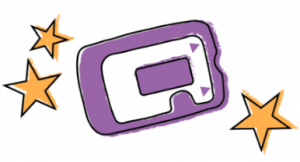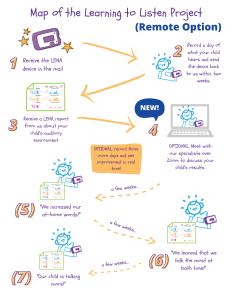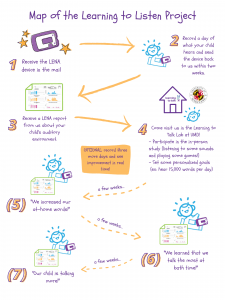The Learning to Listen Project is designed as both a research study and a program for parents to learn how to improve their child’s early auditory environment! The initial study consists of a remote recording, an in-person visit to our lab, and optional remote recordings for you to see improvement of your child’s auditory environment over time.
The Learning to Listen Project consists of two phases:
1. Record a day of listening and talking at home

-
You will receive all of the materials you need in the mail. Your child will wear a small vest or shirt with a pocket in the front. Inside the pocket, you will place a small device called the LENA (Language ENvironment Analysis) device. We also call the device a “talk pedometer,” because it measures how how much language your child hears and uses!
-
There are only 4 steps to creating a successful LENA recording:
-
1) Press “Power”
-
2) Press “Record”
-
3) Insert in vest pocket, snap closed, then put vest on child
-
4) Leave it alone, and it will turn off by itself
-
Click HERE to learn more about how to make a LENA recording!
-
After the recording day, send the recorder, vest/shirt, and the Activity Log back in our prepaid mailer! You should receive the device, record, and send it back within two weeks as we have a small number of recorders and lots of listening to record!
-
We will then analyze the data with the LENA algorithms and send you a personalized report of your child’s auditory environment. Our specialists are available to discuss the results with you and set some goals with you for how you can use this information to improve your child’s speech and language skills.
Click HERE to learn more about how to read a LENA report!


2. Visit the Learning to Talk Lab at UMD and participate in the in-person study
-
The Learning to Talk Lab is located on the ground floor of Taliaferro Hall at University of Maryland, College Park.
-
After receiving the recording, we will contact you to schedule your in-person visit to the lab. We can pay for and arrange your transportation to our campus, or we can meet you at your local audiology clinic to complete the in-person portion of the study. The appointment will be less than an hour, and we have a dedicated play space in our lab for siblings to have fun while they wait. Parking is free, and the whole family is invited! We can be your hosts for the day to explore the beautiful campus of UMD, College Park.
-
At your appointment, your child will participate in some speech and word-learning games, and their eye movements will be tracked on a computer. Our eye-tracking system shows us how children “see” language. For example, in one game, a sentence is read and children click one of four images on the screen that matches the last word they heard.
![]()

-
At the appointment, our specialists will be available to discuss your child’s LENA report with you and help set specialized goals for your child’s auditory environment, such as aiming to hear 15,000 words a day.

BONUS: Optionally, you can complete three more recordings over the course of a few months to implement the goals you set during your visit to the Learning to Talk Lab and see your hard work pay off! We will send you the recorder and pay for you to send it back to us each time, and you will receive a LENA report and $25 in compensation for each recording!
NEW!
If you don’t live in the DMV and would still like to participate, you can sign up for our completely remote option!
You can complete the initial recording (and bonus recordings) with your child, contribute to growing cochlear implant research, and learn about your child’s speech and language development at the same time, all from the comfort of your home!
When you sign up for our study on the homepage of our website, we will contact you and ask if you’d like to participate remotely or if you’d like to complete the in-person portion.
For each recording that you complete, you will receive $25 in compensation and invaluable information about your child’s speech and language development!

